Exploring Mexico and the Muxe Community as a Non-Binary Traveler
When I left Europe, I was at a low point in my life. I was tired of politics demonizing gender-affirmation attempts, tired of legislation for LGBTQ+ and reproductive rights going backward, and overall saddened by injustice. I was in the middle of not only a global but a personal crisis.
I left because I was scared the current crisis would bring out the worst in people. When you lose your sense of community and your neighbors become your enemies, it’s hard to be kind and accepting.
I decided to travel to Central America and make a long stop in Mexico, to be immersed in a culture and language (being born and raised in Mediterranean Italy) closer to my own, and to find the warmth and closeness to the community I was missing back home.
My wishes were fulfilled. During my six months in Mexico, I went from the tropical Yucatan to the desertic Northern regions, touching on every state except six which, at the time, were in the no-travel zone.
I met wonderful people and connected with fantastic groups. I had amazing food, and I saw places I thought only existed in dreams and adventure novels. Now that I have visited the Huasteca Potosina and the beautiful Sumidero Canyon, I have new standards for nature locations.
In hindsight, it was one of the best trips of my life. Not only because Mexico is one of the most breathtaking countries I have visited, but also because for the first time in my life, I was living openly as a non-binary person.
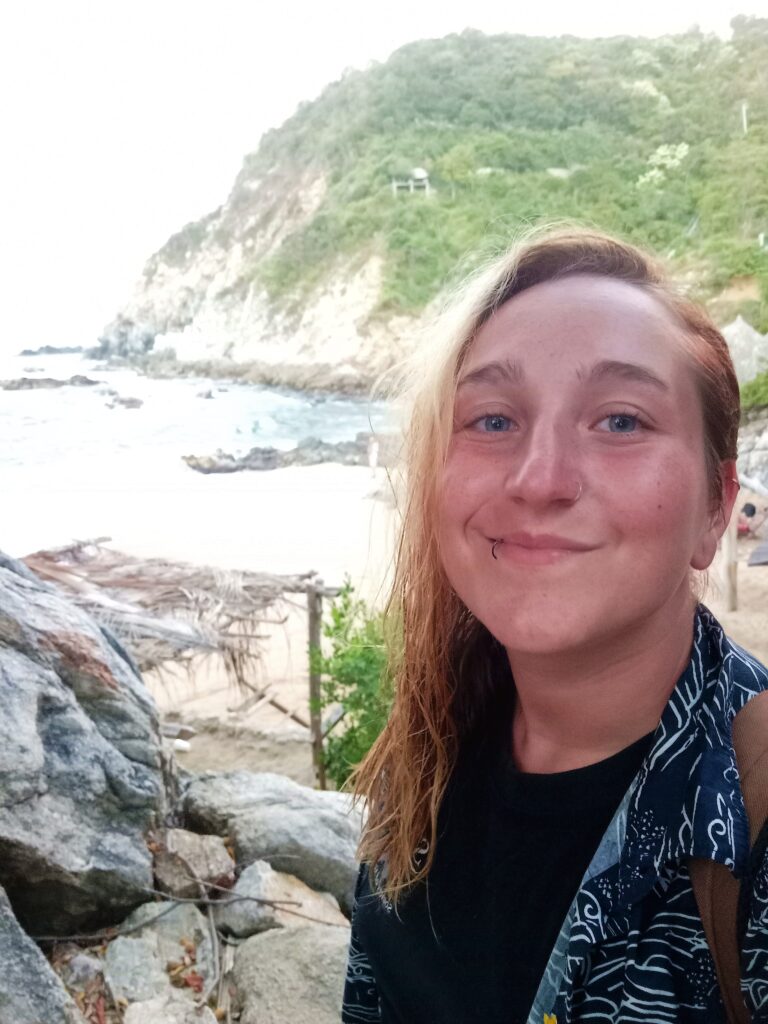
The Challenges of Traveling as a Non-Binary Person
Traveling as a non-binary person can increase your stress level instead of reducing it, especially if you’re looking for a relaxing getaway. For me, traveling to Mexico, the first obstacles were the obvious ones: documents and transportation. When crossing borders as a trans or non-binary person, this is something you know is looming, wherever you travel.
I had to stick to my legal name when it came to official travel records (for example international flights, or my passport details), but I discovered I could easily use my chosen one for any other paperwork, such as hostel registration, volunteer programs, and local transport. Most local venues and providers are fine with it.
Using your chosen name or alias doesn’t work as well at airports. I was at Mexico City International Airport City, and I gave one of the officers my alias instead of my legal name, and I caught myself just in time to rectify my mistake. The officer just smiled at me and gave me my stamped passport back. After a moment of panic, I knew I was alright. That small gesture of understanding made me hopeful.
I found out, traveling from one city to the other, that Mexico doesn’t give you a hard time with documentation and official names as much as its northern neighbors or Europe would. My memory is still vivid of my latest interrail trip, where I was kicked off of a train in Prague because my names didn’t match.
Traveling from point A to B wasn’t what I was there for. I was really in search of community and seeking my first queer travel experiences.
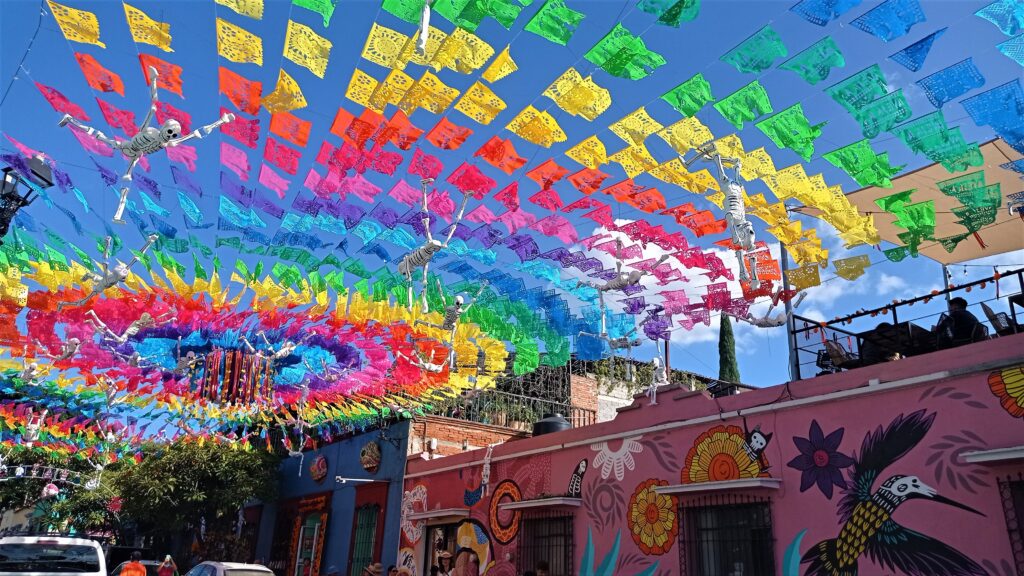
Cancun, Playa, Tulum: Mexico’s Queerish Spaces
A couple of nights out in Playa del Carmen and Cancun told me that gay/lesbian and trans spaces in the local Queer scene were not what I was hoping for. Places like Laser Hot Bar and Habana Night Club are famous for their boozy fun nights and beloved drag shows, but people I talked to were very honest that these venues were not necessarily welcoming spaces for trans patrons.
When I asked one of the drag entertainers at the Habana whether it was safe to be openly trans, they simply said: “Most nights it’s fine, but it’s common that people [like us] don’t feel safe hooking up or simply talking to some of the patrons.”
The bottom line I got from them was that you must “lay low” to not attract unwanted attention for the way you present yourself.
On the night I left Playa del Carmen, however, I was surprised to stumble upon a trans-inclusive and drag queen-led music event in the main square at the Palacio Municipal. There were only a few people and not all of them were supportive. Hecklers could be heard in the background, but I had the feeling that this was a sign that things are changing.
Later, I read that Tulum was organizing similar shows, and proudly displaying the trans-inclusive and intersex rainbow flag in a few known gay bars. I believe more of these events and spaces will pop up, as more queer people flock to Mexico as a welcoming destination.
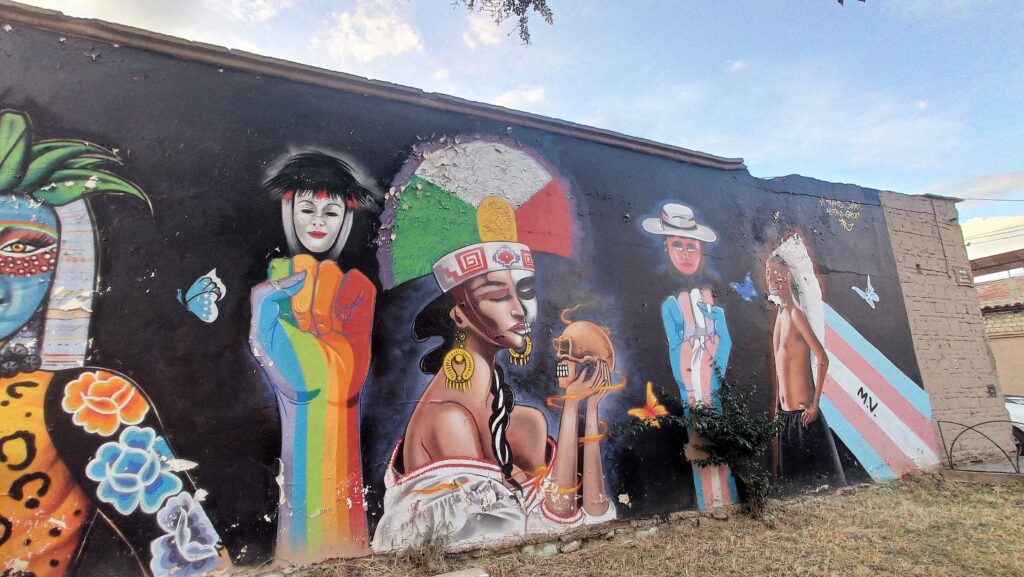
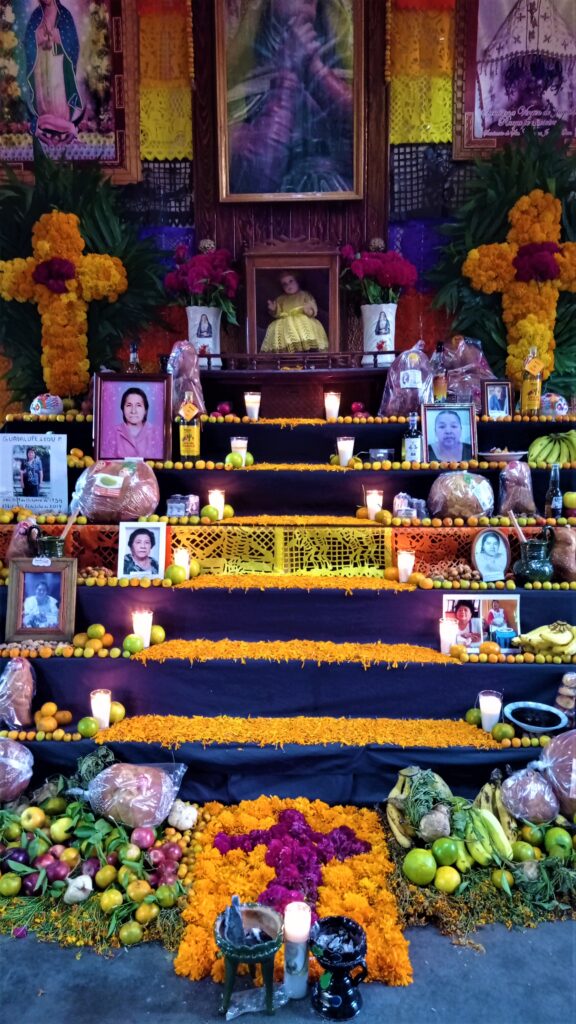
Finding a Community: Muxe Culture in Oaxaca
My true moment of reckoning arrived when I left the tropics to head towards the mountainous Oaxaca, the region known as the ‘heart of Mexico’. Thanks to a local mentor back in the Yucatan, I arrived prepared to find out everything I could about the muxe community and to join in their celebrations for the Dia de Los Muertos parade.
Muxes (sometimes spelled muxhes) are assigned male at birth but can identify as different genders and keep the indigenous Zapotec tradition of gender fluidity alive. They are one of the last surviving indigenous communities in the state of Oaxaca. It’s a place worth a visit for its nature locations, amazing food, and mesmerizing homonymous capital. Natural beauty spots such as the ‘rock waterfalls’ of Hierve el Agua and the mountainous Capulalpam de Méndez should be at the top of your list if you love nature trails.
Besides, the state is famous across Mexico for keeping culinary traditions alive, from chocolate, chili, and mole to tlayudas, large corn tortillas topped with fresh produce and nicknamed the ‘Mexican pizza.’
The region is also one of the safest places in Mexico (consistently in the ‘moderate precaution’ zone according to the US travel advisory), and definitely, the safest I have visited for non-binary and trans people.
The presence of the muxes embodies the wider local openness to gender non-conforming people. They believe in creating a community where everyone helps one another, and where the mission is not to create another labeled gender alternative but to shed labels altogether. Because I identify as non-binary, this resonated strongly with my own identity and beliefs.
During my time in Oaxaca, I met Salvador and Mixaela, among the last members of the community who are still based in the city. We met for the Dia de Los Muertos, the principal festivity in Mexico, celebrated in November.
My friends, and another dozen people (both local and travelers), regularly meet at the Cafe Brujula (usually Friday, 6 pm) to talk, have coffee, organize events, and just have a good time.
The stories shared in the group vary. From more female-to-male-transition stories to people choosing to live free of pronouns, without feeling the need to pick any gender at all.
The time I spent with them was invaluable, not just because I got to see Mexico, its culture and history, from different lenses, but because it gave me new tools to express my own gender identity.
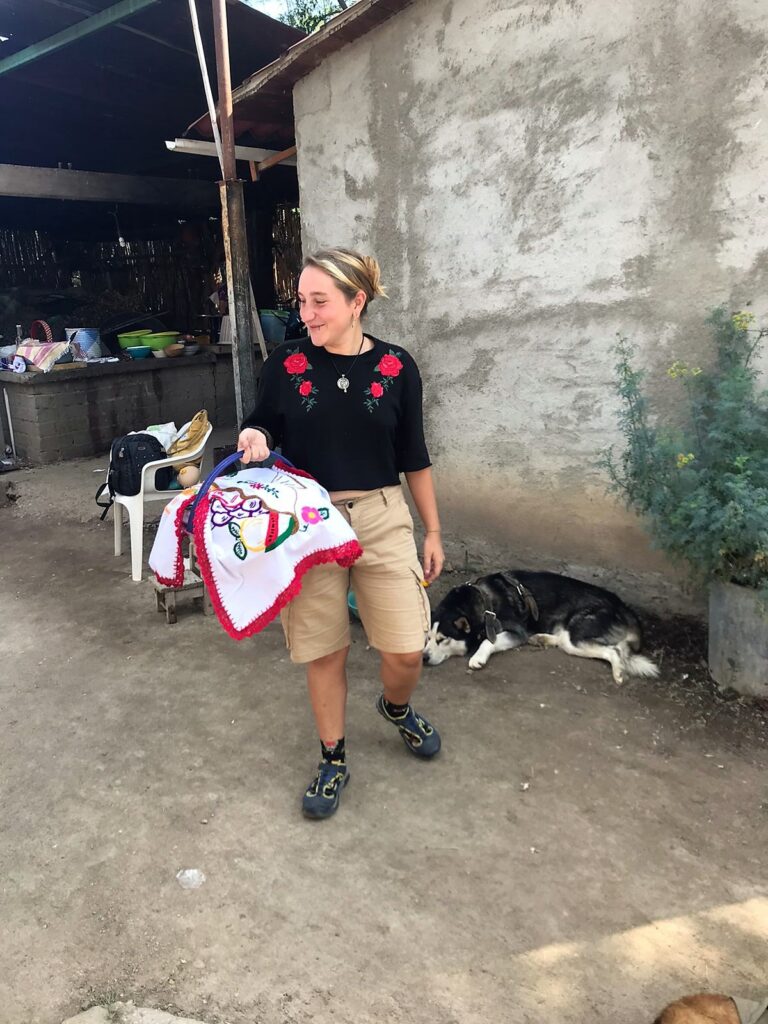
The Place to Go for Non-Binary Travelers
I was not the first Western traveler to float into the arms of the muxe group in Oaxaca and feel thoroughly accepted and understood, and I know for sure I won’t be the last. I found that the community was not alone in its open arms of acceptance. The city itself presents a variety of queer-friendly and trans-positive spaces and opportunities.
Aside from Calendas de Oaxaca (local showcases) and celebrations, local venues are inclusive at popular nightclubs like Txalaparta, cafes like Nueva Babel (hosts a spoken word night for Trans Awareness Week), and niche venues such as Cantina Tobala provide an open and safe atmosphere that’s common throughout the city.
Getting to know the community and exploring the place around it, I had no doubt that this part of Mexico was and is a good travel destination for non-binary travelers like me. My trip didn’t come free of challenges, but the rewards were worth it.
In addition to overwhelming support, the presence of trans and non-binary voices is something that I have not encountered anywhere else in the world. And even in places within Mexico that were not quite there yet like Playa del Carmen, I could see things changing, and moving in a positive direction.
All of us, gender non-conforming people around the world, can learn so much from communities that are ancestrally tied to fluidity and believe strongly in its beauty and validity of it. We have so much to learn from the muxe community.
Now more than ever, some governments and politicians are using their platforms to shift the narrative to this toxic and harmful representation of transgender people as well as slowly chip away at progress toward LGBTQ+ equality. So, non-binary and trans people who are afforded the privilege to travel to international destinations like Mexico should know that there are LGBTQ+-friendly communities that affirm who we are, what we fight for, and why we matter.
Thinking about exploring other places in Mexico? Check out more of our Mexico content for travel inspiration about Merida, Todos Santos, Adventure in Puerto Vallarta, taking a dip into a cenote, and more!

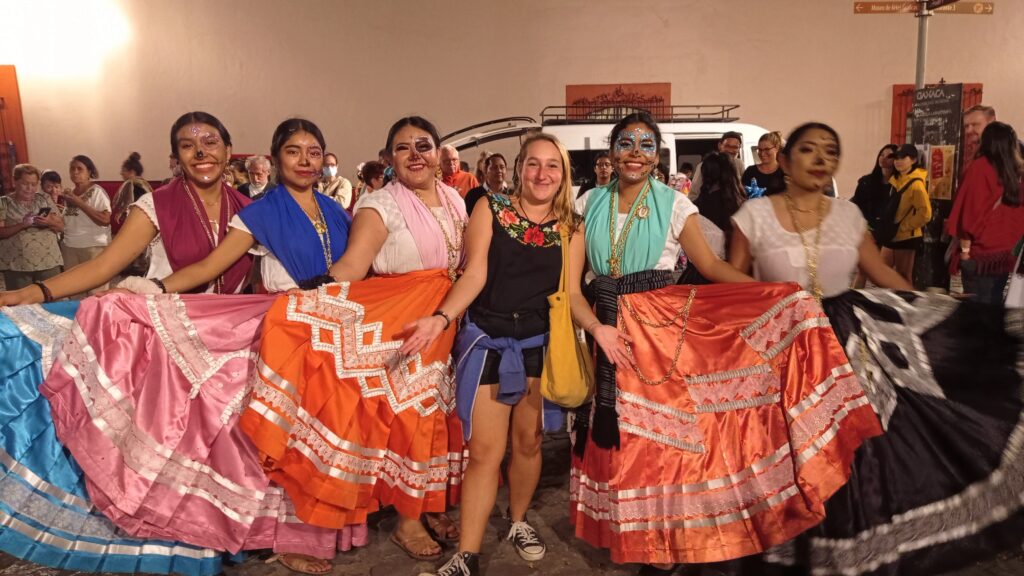


Thank you for this post. I’m happy to hear that you felt safe in Oaxaca. I will be traveling to Oaxaca in the spring with my (queer) family. Could you recommend any queer-friendly language schools for me? Thank you.
Ami suggested a place recommended by a few folx. It’s Laguarida Coop (https://www.laguaridacoop.com/). He’s never had any personal experience with it, and it may not be the most affordable option.